Related Research Articles
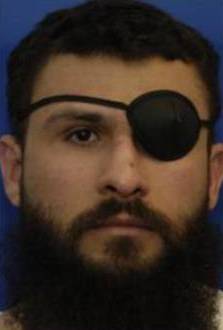
Abu Zubaydah is a Palestinian citizen and alleged terrorist born in Saudi Arabia currently held by the U.S. in the Guantanamo Bay detention camp in Cuba. He is held under the authority of Authorization for Use of Military Force Against Terrorists (AUMF).

Waterboarding is a form of torture in which water is poured over a cloth covering the face and breathing passages of an immobilized captive, causing the person to experience the sensation of drowning. In the most common method of waterboarding, the captive's face is covered with cloth or some other thin material and immobilized on their back at an incline of 10 to 20 degrees. Torturers pour water onto the face over the breathing passages, causing an almost immediate gag reflex and creating a drowning sensation for the captive. Normally, water is poured intermittently to prevent death; however, if the water is poured uninterruptedly it will lead to death by asphyxia. Waterboarding can cause extreme pain, damage to lungs, brain damage from oxygen deprivation, other physical injuries including broken bones due to struggling against restraints, and lasting psychological damage. Adverse physical effects can last for months, and psychological effects for years. The term "water board torture" appeared in press reports as early as 1976.
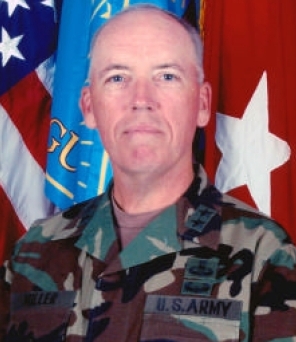
Geoffrey D. Miller is a retired United States Army major general who commanded the US detention facilities at Guantanamo Bay, Cuba, and Iraq. Detention facilities in Iraq under his command included Abu Ghraib prison, Camp Cropper, and Camp Bucca. He is noted for having trained soldiers in using torture, or "enhanced interrogation techniques" in US euphemism, and for carrying out the "First Special Interrogation Plan," signed by the Secretary of Defense, against a Guantanamo detainee.

Mustafa Ahmed Adam al-Hawsawi is a Saudi Arabian citizen. He is alleged to have acted as a key financial facilitator for the September 11 attacks in the United States.
Extrajudicial prisoners of the United States, in the context of the early twenty-first century War on Terrorism, refers to foreign nationals the United States detains outside of the legal process required within United States legal jurisdiction. In this context, the U.S. government is maintaining torture centers, called black sites, operated by both known and secret intelligence agencies. Such black sites were later confirmed by reports from journalists, investigations, and from men who had been imprisoned and tortured there, and later released after being tortured until the CIA was comfortable they had done nothing wrong, and had nothing to hide.

Mohammed Farik Bin Amin, alias Zubair Zaid, is a Malaysian who is alleged to be a senior member of Jemaah Islamiyah and al Qaeda. He is currently in American custody in the Guantanamo Bay detention camp. He is one of the 14 detainees who had previously been held for years at CIA black sites. In the ODNI biographies of those 14, Amin is described as a direct subordinate of Hambali. Farik Amin is also a cousin of well-known Malaysian terrorist Zulkifli Abdhir.
"Enhanced interrogation techniques" or "enhanced interrogation" was a program of systematic torture of detainees by the Central Intelligence Agency (CIA), the Defense Intelligence Agency (DIA) and various components of the U.S. Armed Forces at remote sites around the world—including Bagram, Guantanamo Bay, Abu Ghraib, and Bucharest—authorized by officials of the George W. Bush administration. Methods used included beating, binding in contorted stress positions, hooding, subjection to deafening noise, sleep disruption, sleep deprivation to the point of hallucination, deprivation of food, drink, and medical care for wounds, as well as waterboarding, walling, sexual humiliation, rape, sexual assault, subjection to extreme heat or extreme cold, and confinement in small coffin-like boxes. A Guantanamo inmate's drawings of some of these tortures, to which he himself was subjected, were published in The New York Times. Some of these techniques fall under the category known as "white room torture". Several detainees endured medically unnecessary "rectal rehydration", "rectal fluid resuscitation", and "rectal feeding". In addition to brutalizing detainees, there were threats to their families such as threats to harm children, and threats to sexually abuse or to cut the throat of detainees' mothers.

John Chris Kiriakou is an American author, journalist and former intelligence officer. Kiriakou is a columnist with Reader Supported News and co-host of Political Misfits on Sputnik Radio.

Steven Gill Bradbury is an American attorney and government official who served as the General Counsel of the United States Department of Transportation. He previously served as Acting Assistant Attorney General (AAG) from 2005 to 2007 and Principal Deputy AAG from 2004 to 2009, heading the Office of Legal Counsel (OLC) in the U.S. Department of Justice during President George W. Bush's second term.
The Intelligence Authorization Act for Fiscal Year 2008 would have authorized funding levels for the 13 government intelligence agencies and increased oversight for the U.S. intelligence community. The bill would have also applied the standards in the U.S. Army Field Manual to the entire government, effectively barring the CIA and other agencies from using tactics like waterboarding in their interrogations. The bill was sponsored by Rep. Silvestre Reyes.

Ali H. Soufan is a Lebanese-American former FBI agent who was involved in a number of high-profile anti-terrorism cases both in the United States and around the world. A 2006 New Yorker article described Soufan as coming closer than anyone to preventing the September 11 attacks and implied that he would have succeeded had the CIA been willing to share information with him. He resigned from the FBI in 2005 after publicly chastising the CIA for not sharing intelligence with him which could have prevented the attacks.
James Elmer Mitchell is an American psychologist and former member of the United States Air Force. From 2002, after his retirement from the military, to 2009, his company Mitchell Jessen and Associates received $81 million on contract from the CIA to carry out the torture of detainees, referred to as "enhanced interrogation techniques" that resulted in little credible information.

Abu Zubaydah is a Saudi citizen who helped manage the Khalden training camp in Afghanistan. Captured in Pakistan on March 28, 2002, he has since been held by the United States as an enemy combatant. Beginning in August 2002, Abu Zubaydah was the first prisoner to undergo "enhanced interrogation techniques." Since the Spanish Inquisition, these practices have been characterized as torture by many familiar with the techniques. There is disagreement among government sources as to how effective these techniques were; some officials contend that Abu Zubaydah gave his most valuable information before they were used; CIA lawyer John Rizzo said he gave more material afterward.
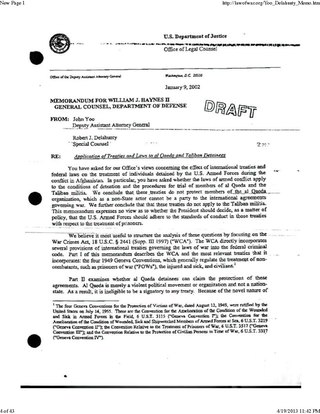
A set of legal memoranda known as the "Torture Memos" were drafted by John Yoo as Deputy Assistant Attorney General of the United States and signed in August 2002 by Assistant Attorney General Jay S. Bybee, head of the Office of Legal Counsel of the United States Department of Justice. They advised the Central Intelligence Agency, the United States Department of Defense, and the President on the use of enhanced interrogation techniques—mental and physical torment and coercion such as prolonged sleep deprivation, binding in stress positions, and waterboarding—and stated that such acts, widely regarded as torture, might be legally permissible under an expansive interpretation of presidential authority during the "War on Terror".

John Bruce Jessen is an American psychologist who, with James Elmer Mitchell, created the so-called "enhanced interrogation techniques" that were used in the interrogation and torture of CIA detainees and outlined in the United States Senate Select Committee on Intelligence's report on CIA torture. In that report, he was mentioned under the pseudonym "Hammond Dunbar." His company, Mitchell Jessen and Associates, earned US$81 million for its work.

John Anthony Rizzo was an American attorney who worked as a lawyer in the Central Intelligence Agency for 34 years. He was the deputy counsel or acting general counsel of the CIA for the first nine years of the War on Terror, during which the CIA held dozens of detainees in black site prisons around the globe.
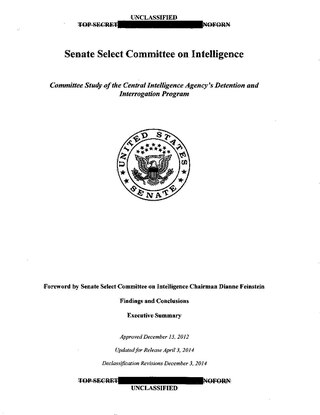
The Committee Study of the Central Intelligence Agency's Detention and Interrogation Program is a report compiled by the bipartisan United States Senate Select Committee on Intelligence (SSCI) about the Central Intelligence Agency (CIA)'s Detention and Interrogation Program and its use of torture during interrogation in U.S. government communiqués on detainees in CIA custody. The report covers CIA activities before, during, and after the "War on Terror". The initial report was approved on December 13, 2012, by a vote of 9–6, with seven Democrats, one Independent, and one Republican voting in favor of the report and six Republicans voting in opposition.

Gina Cheri Walker Haspel is an American intelligence officer who was the director of the Central Intelligence Agency (CIA) from May 21, 2018, to January 20, 2021. She was the agency's deputy director from 2017 to 2018 under Mike Pompeo, and became acting director on April 26, 2018, after Pompeo became U.S. secretary of state. She was later nominated and confirmed to the role, making her the first woman to become CIA director on a permanent basis.
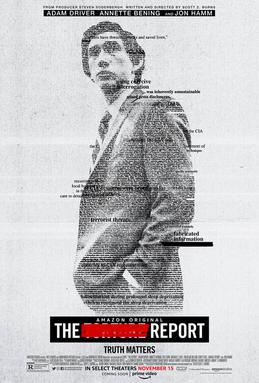
The Report is a 2019 American historical political drama film written and directed by Scott Z. Burns that stars Adam Driver, Annette Bening, Ted Levine, Michael C. Hall, Tim Blake Nelson, Corey Stoll, Maura Tierney, and Jon Hamm. The plot follows staffer Daniel Jones and the Senate Intelligence Committee as they investigate the Central Intelligence Agency's use of torture following the September 11th attacks. It covers more than a decade's worth of real-life political intrigue, exploring and compacting Jones's 6,700-page report.
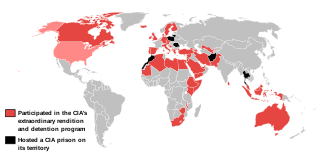
The CIA controls black sites used by the U.S. government in its War on Terror to detain people deemed to be enemy combatants.
References
- ↑ Katherine Hawkins (2015-09-15). "Re: Wrongful classification of information regarding CIA torture, in violation of Executive Order 13526". OpenTheGovernment.org . pp. 13–16. Retrieved 2020-01-26.
Charlie Wise is not identified by name or pseudonym in the Senate torture report, but is referred to by title as the CIA's chief of interrogations. According to press reports, Wise was forced to retire from the CIA in 2003, and died of a heart attack the same year.
- 1 2 3 4 Greg Miller; Adam Goldman; Julie Tate (2014-12-09). "Senate report on CIA program details brutality, dishonesty". The Washington Post . Archived from the original on 2014-12-10. Retrieved 2020-01-26.
At times, senior CIA operatives voiced deep misgivings. In early 2003, a CIA officer in the interrogation program described it as a 'train [wreck] waiting to happen' and that 'I intend to get the hell off the train before it happens.' The officer, identified by former colleagues as Charlie Wise, subsequently retired and died in 2003. He had been picked for the job despite being reprimanded for his role in other troubled interrogation efforts in the 1980s in Beirut, former officials said.
- 1 2 3 4 5 6 Julian Borger (2020-10-25). "Chilling role of 'the Preacher' confirmed at CIA waterboarding hearing in Guantánamo". The Guardian . Guantanamo Bay detention camp . Retrieved 2020-01-26.
In the courtroom this week, the interrogations chief has been referred to by the code NX2. Mitchell calls him the "new sheriff", but it has been reported his real name was Charlie Wise, who had honed his craft carrying out interrogations for the Contra rebels in Nicaragua in the 1980s.
- 1 2 Jason Leopold (2015-05-19). "The Watchdog, the Whistleblower, and the Secret CIA Torture Report". Vice magazine . Retrieved 2020-01-26.
Many of the Panetta Review's findings about misattributed intelligence and the brutal treatment of detainees using unauthorized techniques singled out the CIA's chief of interrogations, Charlie Wise, who authorized the rectal feeding of Khan and other CIA captives, intelligence officials told VICE News. Wise — who was not named in the Senate's report — was the subject of at least one scathing complaint filed by another interrogator with the inspector general during the interrogation program's early days. The complaint remains classified. Wise died of a heart attack after retiring from the CIA.